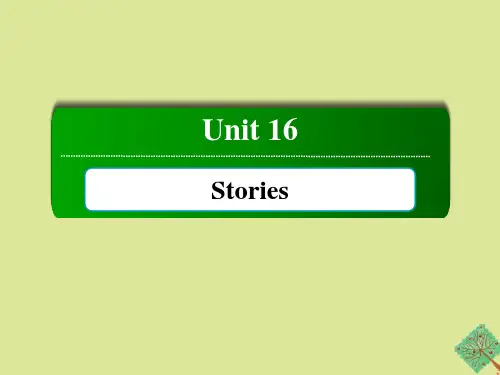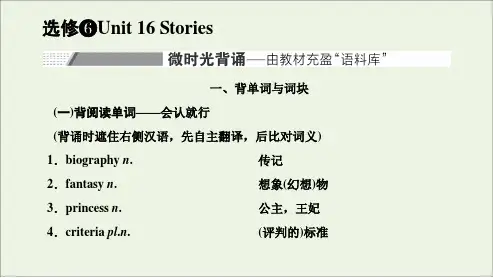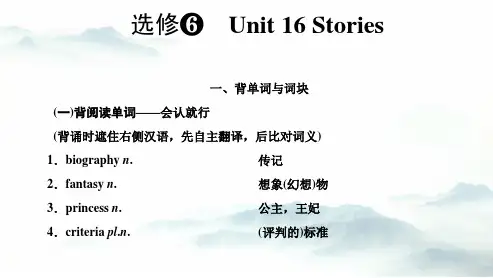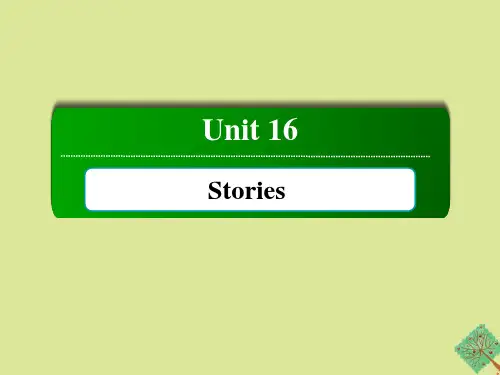北师大版高中英语课文Unit-16-Stories
- 格式:doc
- 大小:42.50 KB
- 文档页数:12











北师大版高中英语课文U n i t S t o r i e s公司内部编号:(GOOD-TMMT-MMUT-UUPTY-UUYY-DTTI-Unit 16 StoriesWarm-upTapescript1 It was a dark and foggy night. We drove and drove. At midnight, just as we thought we were lost, we saw a light behind some trees. As we got nearer, we could see a house. It looked abandoned. We knocked on the heavy door. It opened slowly. A tall man dressed entirely in black stood there. “Good evening,” he said in a slow, deep voice.“I've been expecting you.”2 We were travelling through deep space at the speed of light. Suddenly, the spaceship slowed down and immediately the system came into view – a bright star with twenty or more planets. One of these would be our new home, five light years from our own planet.3 One of my earliest memories is of my father running along the beach with our dog, Tess. I must have been about three years old. I remember the dog jumping up on me and knocking me over into the water.4 The man lay on the ground next to a white truck. There was no doubt. He was dead. I quickly looked in the pockets of his jacket –some money, a handkerchief and a theatre ticket with a Chicago phone number written on it. Three murders in three weeks and the victims all killed in the same way.5 Once upon a time, there lived a beautiful princess. She was an only child and her father and mother, the king and queen, loved her very much. One day, an old woman came to the castle. When she saw the princess, she smiled and laughed in a strange and horrible way.Lesson 1 Stories from HistoryPompeii: The city that became a time capsuleAround the end of the first century AD, a Roman writer called Pliny wrote about a terrible volcanic eruption that he had witnessed as a young man. The eruption had occurred on August 24th, 79 AD. The earth began to tremble and a volcano named Vesuvius, near Pompeii, Italy, erupted. Pliny described a cloud coming down the mountain, blocking out the sun and burying everything in its path, including whole villages and towns.This particularly sad event left a deep impression on Pliny who had lost an uncle in the eruption. Yet, over the centuries, there was a greater loss. The people, towns and villages that had disappeared under the ashes were entirely forgotten by the world.However, more than 1,600 years later, some scientists found the lost towns that had been buried under the ashes. By 1748, they had found an awesome historical site. They had started to dig out the ancient city of Pompeii.In a way, Pompeii is like a “time capsule” preserving a frozen moment in history. Before the eruption occurred, it had been a booming Roman city with temples, markets, restaurants and theatres. Now as you walk along the streets of the city, time rewinds. You can admire the ancient architecture, statues, decorated walls and authentic objects characteristic of the time.However, much more than buildings and objects, it is the forms of the people who were caught in the disaster that have made the city a monument to human history.The bodies of people who had died in Pompeii left impressions in the ash that showed their exact shapes. As you walk, you will pass people gathered together for protection in their last hours of life. One person, sitting alone, looks like he is praying. Another man,lying on his side, looks as if he is trying to get up. One can only feel sorrow and deep sympathy for these once-living statues.Today, more than 250 years after scientists found the city, thousands of tourists and hundreds of scientists visit Pompeii every year to learn more about the ancient world. In this way, the city, which the world had once forgotten, lives on nearly 2,000 years after its loss.Lesson 2 Name StoriesTapescriptWang Jiannan: My name is Wang Jiannan and like many Chinese names, Jiannan doesn't have just one specific meaning. When my parents were looking for a name for me, they came across the character “Nan”. “Nan” is a type of wood that is used to hold up the roof in the construction of traditional Chinese houses.Therefore my parents chose this character for me because they wanted me to grow up to be a “pillar of society” – someone whohelps to build a better future. But, as well as having meaning fromthe characters that are used for writing, Chinese names can also have significance according to their sounds. In my case, Jiannan soundslike “healthy boy”.Some people think it's abnormal to name a girl “healthy boy”,but I don't. My parents gave me this name because they wanted me to be as strong as any boys. I guess you think that's enough significancefor one name but there's more. “Jiannan” sounds like another set of characters that stand for “built in the south” and we come from the southern part of our province. So my name tells me where I am from and it tells me what to aim for!Heather Smith: My name is Heather Smith. “Smith” is one of the most common names in Britain. A smith is somebody who works with metal. Other family names with the same origin include Smithers and Smythe. I guess there were lots of smiths in Europe in the days when horses werethe fastest form of land transport and riders counted on the services of smiths for metal horse shoes. Well there are very few of them these days and no one in my family can figure out which ancestor was a smith but I suppose we must have had one sometime in the past. My first name is easier to explain. “Heather” is a purple flower that grows a lot in certain parts of the country. My mother comes from a place in northern England where heather turns whole hills a vivid purple every July. But when she had me, she was living in London and although she was delighted to have a new baby girl, she was also discouraged because she missed her home in northern England, and because her mother, my grandmother, was ill at that time and couldn't come to London to see us. So my mother named me Heather to remind her of home and so my grandmother would think of me every time she saw the beautiful heather covering all the hills surrounding her home. Now my mother says I look like my grandma.Isaac Evans: My name is Isaac Evans. It's a very conventional name that doesn't stand out anywhere and you wouldn't think it had a story to it, but I believe that when you dig deep enough, every name has a story to it. “Evans” is a very common Welsh name and I'm not s ure exactly what it means, only that there are many “Evans” in Wales and all around Britain. My grandfather left his farm in northern Wales to look for work when he was seventeen and he ended up in Manchester.There's a lot of industry there. He put up with a lot of hardship and suffering all his life to provide a good future for his family and I'm grateful for that.“Isaac” is a fairly common boy's name. You might think thatI got called “Isaac” because my parents couldn't think ofanything else to call me! But you'd be wrong. My parents are classical musicians and they named me after a famous violinist called Itzhak Perlman. They admired him because he was a great musician and hewasn't afraid to try out new ideas in his music. I don't play amusical instrument, but I am a painter and I often listen to classical music when I paint. When I listen to Itzhak Perlman's music, itinspires me.TapescriptGuo Jiangsheng: My name is Guo Jiangsheng. Jiangsheng means “born on the river”, and guess what I was born on a boat! My family livesin a small mountain village. My parents needed to travel by boat to Chongqing where my mother was going to stay in a hospital for my birth. They were still on the boat outside Chongqing when suddenly my mother started to feel some pain. Then I was born. My parents got off theboat with their new baby and then went to the hospital to see if everything was OK. The doctors and nurses were very surprised and saidmy mother and I were both very healthy. After that my parents decided I should be called Jiangsheng!TapescriptAmazing But True!One day, a fisherman on the Arral Sea was sailing home after aday's work. It was raining and he didn't feel very happy. He hadn't had a very good day and hadn't caught very many fish. Suddenly, he heard a strange noise. A cow was flying towards his boat! The cow hit the boat and nearly destroyed it. When the fisherman got back home, people didn't believe his story. Then, some time later, the US Air Force showed that the fisherman had told the truth. While one of their transport planes was flying over the Arral Sea, a cow on the plane had gone mad and the pilot had thrown it out into the sea!Lesson 3 Life StoriesHelen KellerHelen Keller was a very special girl who needed a superb teacher. By the time she was seven years old, she still couldn't speak, read or write. This was because Helen couldn't see or hear. With these severe restrictions on her communication, Helen's behaviour was often unbearable.She was stubborn and angry, and often broke things when she wasn't understood.Anne Sullivan was brought in to help Helen. Anne was a teacher and former student at a school for the blind in Boston. She had hadeyesight problems early in life as well so she could relate to Helen's difficulties. Her first goal was to stop Helen's troublesome behaviour. Helen would need this valuable preparation in order to learn language. She would also need lots of love. When Anne and Helen first met, Anne gave Helen a big hug.Helen would have to learn to understand words spelled on her hand. Anne's technique was simple and straightforward. She would put anobject into one of Helen's hands and spell the word into her other hand. She started with dolls. She would let Helen play with the doll, and then spell the letters “D-O-L-L” into her hand. Helen thoughtthis was a game. She had a precise description of her excitement inher book, The Story of My Life: “Running downstairs to my mother, I held up my hand and made the letters for doll. I did not know that I was spelling a word or even that words existed; I was simply making my fingers go in monkey-like imitation.”Then one day, Anne took Helen out to the well. Anne put Helen's hand under the water. As the water flowed over one hand, Anne spelled “w-a-t-e-r” into the other han d. Then suddenly, Helen had a burst of understanding; the movement of the fingers meant the cool waterflowing over her hand. This precious knowledge gave her hope and joy. Finally, the world of words was opening up to her.Now that Helen understood the key to language, she was very eager to learn more and use it as much as she could. Children who can see and hear learn language easily but for Helen, it was a gradual and sometimes painful process.However, the results were amazing. As Helen's knowledge and vocabulary expanded, she asked more and more questions. This soon led her to discover more complex words and changed her thinking processes.Trying to learn the word “love” was an experience that she remembered well. This is how she described it in her book, The Story of My Life:“I remember the morning that I first asked the meaning of the word ‘love'. This was before I knew many words. I had found a few early violets in the garden and brought them to my teacher ... Miss Sullivan put her arm gently round me and spelled into my hand, ‘I love Helen.' ‘What is love' I asked. She drew me closer to her and said, ‘It is here,' pointing to my heart ... Her words puzzled me very much because I did not then understand anything unless I touched it.”The meaning of love was still not apparent to Helen but she kept on trying to understand. “I smelt the violets in her hand and asked,half in words, half in signs, a question which meant, ‘Is love the sweetness of flowers' ‘No,' said my teacher.” Helen then felt the warmth of the sun shining on them. She pointed up and asked if that was love. When her teacher said that it wasn't, she was confused and disappointed. “I thought it strange that my teacher could not show me love.”The word “think” was also a difficult one for Helen but she had a breakthrough while working on a simple task. She was making necklaces with the help of Miss Sullivan when she noticed that she had made some mistakes. Uncertain about how to fix them, she stopped to think carefully.As she did this, Miss Sullivan touched Helen's head and spelled the word “think” into her hand.“In a flash I knew that the word was the name of the process that was going on in my head.” It was the first time Helen had understood such a complex word — a word for something she couldn't touch. Atthat moment, her mind returned to the word “love”. As she thought about its meaning again, the sun came out. She pointed to the sun and asked her teacher again if that was love. Anne answered Helen by explaining that love was like the sun and clouds in a way.“You cannot touch the clouds, you know; but you feel the rain … You cannot touch love either; but you feel the sweetness that it poursinto everything. Without love you would not be happy or want to play.” In that vivid moment, Hel en finally understood the beautiful truth of the word “love”.Communication WorkshopTapescriptOnce upon a time, hundreds of years ago, there was a king called Orpheus and his queen, Eurydice. They loved each other very much. King Orpheus loved playing the harp and he played it beautifully.Queen Eurydice loved nature and used to go out into the country every day. One day in spring, she went walking in the fields. After a while she felt tired. She sat down under an apple tree and soon fell asleep. While she was sleeping, the king of the fairies came past and saw her.The king thought she was beautiful and decided to take her away with him. He took her on his horse to his palace in a beautiful green valley. When King Orpheus heard that his wife had gone, he was very sad. He had loved Eurydice so much. He didn't want to live in the place which reminded him of his queen. He left it and went to look for Eurydice.Orpheus went to live in the woods. He took only his harp with him. For months and months he searched for Eurydice. His only pleasure washis harp. When he played it, all the birds and animals in the forest would come and listen to the music.One day, when he was in the woods, he saw a group of people. It was the king of the fairies! He followed them until they came to the palace of the king of the fairies. Orpheus knocked on the door. He said he was a musician and he had come to play for the king of the fairies. He went into the palace and saw lots of people – among them was his wife Eurydice! He tried to speak to her, but she couldn't speak to him and she couldn't go away with him. She needed permission from the king of the fairies. Orpheus started playing his harp. Everybody in the palace listened.“Your music is so beautiful that I will give you anythin g you wish,” said the fairy king to Orpheus. “Thank you, my lord. I will take my wife Eurydice away with me.” The fairy king gave him permission to leave the fairy palace. Then, Orpheus took Eurydice back to his kingdom and they both lived happily ever after.。
Unit 16 Stories
Warm-up
Tapescript
1 It was a dark and foggy night. We drove and drove. At midnight, just as we thought we were lost, we saw a light behind some trees. As we got nearer, we could see a house. It looked abandoned. We knocked on the heavy door. It opened slowly. A tall man dressed entirely in black stood there. “Good evening,” he said in a slow, deep voice. “I've been expecting you.”
2 We were travelling through deep space at the speed of light. Suddenly, the spaceship slowed down and immediately the system came into view – a bright star with twenty or more planets. One of these would be our new home, five light years from our own planet.
3 One of my earliest memories is of my father running along the beach with our dog, Tess. I must have been about three years old. I remember the dog jumping up on me and knocking me over into the water.
4 The man lay on the ground next to a white truck. There was no doubt. He was dead. I quickly looked in the pockets of his jacket – some money, a handkerchief and a theatre ticket with a Chicago phone number
written on it. Three murders in three weeks and the victims all killed in the same way.
5 Once upon a time, there lived a beautiful princess. She was an only child and her father and mother, the king and queen, loved her very much. One day, an old woman came to the castle. When she saw the princess, she smiled and laughed in a strange and horrible way.
Lesson 1 Stories from History
Pompeii: The city that became a time capsule
Around the end of the first century AD, a Roman writer called Pliny wrote about a terrible volcanic eruption that he had witnessed as a young man. The eruption had occurred on August 24th, 79 AD. The earth began to tremble and a volcano named Vesuvius, near Pompeii, Italy, erupted. Pliny described a cloud coming down the mountain, blocking out the sun and burying everything in its path, including whole villages and towns.
This particularly sad event left a deep impression on Pliny who had lost an uncle in the eruption. Yet, over the centuries, there was a greater loss. The people, towns and villages that had disappeared under the ashes were entirely forgotten by the world.
However, more than 1,600 years later, some scientists found the lost towns that had been buried under the ashes. By 1748, they had found an。